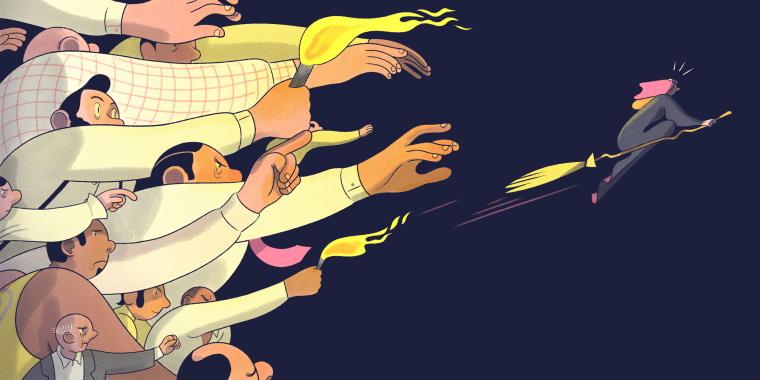In Wiccan lore, this time of year is known as Samhain; according to "A Witches’ Bible" by Janet and Stewart Farrar, it’s a time of “psychic eeriness,” when the veil between the living and dead is very thin. It’s supposedly a time when things that aren’t usually meant to be seen nonetheless appear, when we remember that we’re all going to die someday — so we might as well say what we want and feast and party.
In society at large, too, the veil is lifting. We are seeing how things really are, and many people are increasingly unafraid to look injustice in the face and call it what it is, no matter what that makes others think.
In the past year, it’s dawned on many women and gender non-conforming people more explicitly than ever before that we piss people off. We didn’t have to do anything to justify their animosity, just ask for kindness and rights we already had. We have always been suspect for wanting abortions, for seeking asylum, for wanting to protect our land and for needing health care and maternity leave — but increasingly we are outright vilified for it.
And in the process of that vilification, we have learned what witches have always known: even if things seem fine, they’re not. We have always been witches.
I don’t know if the witches we burned (and still burn) were actually casting hexes and draining blood sacrifices under a full moon; for the most part, I don’t think they did any of that. Any text about a witchcraft trial of yore is full of accusations of possession and casting illness but, reading between the lines, those women were often punished for being suspicious — for acting in opposition to how the dominant society thought a woman should act. They were mean; they were un-Christian; they were in some legal entanglement that made life hard for others; they were not white.
They were witches because something about their existence pissed people off.
Though there are those who claim witchiness as a religious identity, in western society "the witch" is more an identity to which people have turned when times are tough, as a symbol of unruly strength. The witch is a woman who lives apart, and knows how to thrive when she is not accepted by society. And in a patriarchal, capitalist society, women are inherently not accepted. For a while there, that was easier for some to ignore. But in the year since Donald Trump was elected, it’s far more obvious to many that the problems facing women in this country didn’t begin when Trump was inaugurated.
Women began tapping into their inner witches before Trump was elected, though; the desire for witchy things, from dark fashion to women forming actual covens, grew with this generation’s mainstream recognition of feminism. A woman who questions authority and refuses to conform was an easy identity to latch onto: As early as 2015, my "Basic Witches" co-author, Jess Zimmerman, declared witchcraft the new misandry, foreseeing a future in which we turn from being angry at men to ignoring them. We haven’t quite gotten there, but that’s the promise that being a witch provides: One day, your life and thoughts won’t be ruled by men.
I don’t remember the moment I realized I was living in a society stacked against me, but I know there was a before and after: Before, a man calling me a bitch for pushing him off me when he shoved his hands down my pants at a bar, the endless questions about why I didn’t change my name when I got married. My existence pissed people off, and I wasn’t even trying.
By virtue of being a woman, you already are a witch. You might as well embrace it.
Women today find themselves thinking about witches, I believe, because witches have nothing to lose. A witch knows people hate her and, even if it does get to her sometimes, she finds a way to live honestly and joyfully in the face of that. At a moment in which we stand to lose abortion access, health care, wildlife preserves, job protections and more, channeling our inner witches is enticing. If we speak out and fight back we risk, what, ostracization? Unpopularity? We were already there.
Being a witch doesn’t require you to put faith in a system or larger structure, which is enticing as all of our structures repeatedly let us down. Instead, a witch need only have faith in herself. She may have a coven or she may work alone, but she allows herself to feel joy and pain and anger and sadness as she fights. She is the avatar of the whole woman, the one not constrained by how we should act or care. She is, in a certain way, our best selves.
Jaya Saxena is a freelance writer and editor whose work has appeared in ELLE.com, The New Yorker, The Daily Dot, and more. She is also the co-author of Basic Witches.
